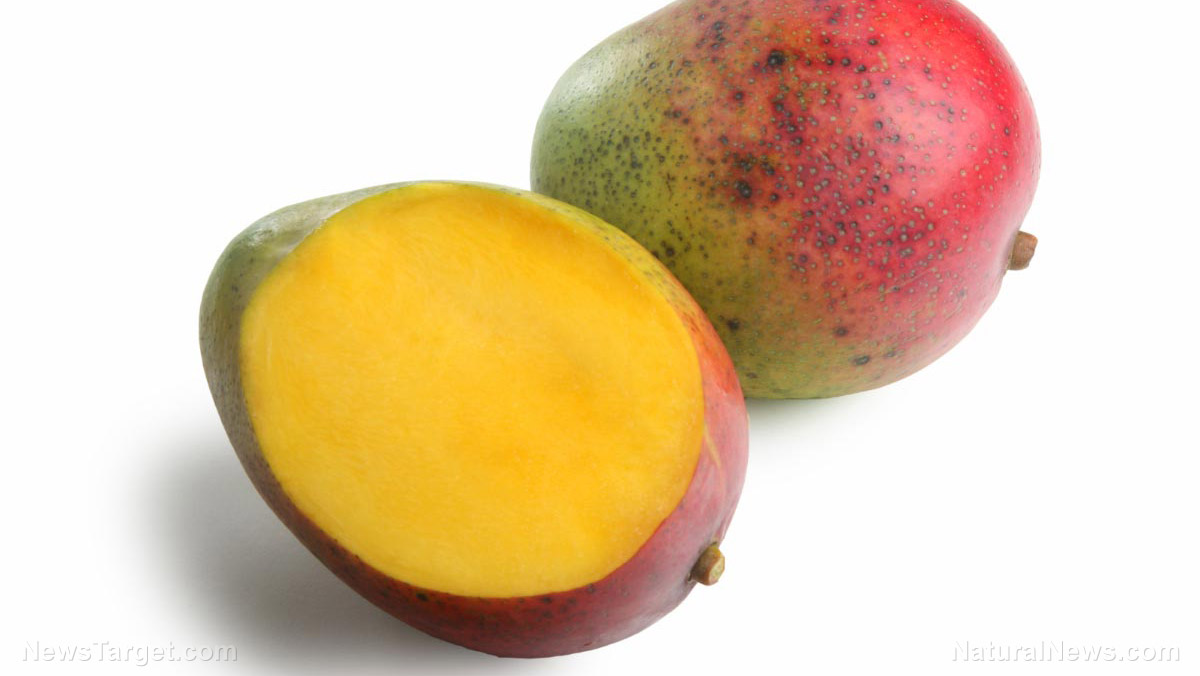From ancient orchards to modern superfood: Mango’s journey as the king of fruits
11/26/2025 / By Ava Grace

- The mango, originating in South Asia over 4,000 years ago, has a rich cultural history and was revered in ancient Indian traditions. It spread globally through trade and exploration, becoming a staple in tropical and subtropical regions, with India remaining as its largest producer.
- Mangoes are celebrated as a superfood due to their high nutrient content, including vitamins A and C, fiber and phytonutrients like mangiferin and beta-carotene. These compounds offer antioxidant, anti-inflammatory and anticancer benefits, supporting overall health.
- Regular consumption of mangoes promotes heart health by lowering cholesterol and blood pressure, boosts immunity through their high vitamin C levels, and enhances skin health by protecting against free radicals and supporting collagen production.
- In traditional medicines like Ayurveda, mangoes are used to balance bodily energies and improve digestion. Modern wellness incorporates mangoes into smoothies, salads and desserts, leveraging their natural sweetness and health benefits.
- Mangoes are prized for their vibrant colors, sweet aroma and juicy texture. They are a versatile ingredient in sweet and savory dishes–from salads and salsas to drinks like mango lassi–making them a global culinary favorite.
The mango (Mangifera indica), often referred to as the “king of fruits,” is more than just a delicious tropical treat. Revered for its vibrant flavor, rich history and impressive nutrient profile, the mango fruit has earned its place among the world’s topmost superfoods. Packed with vitamins, minerals, fiber and antioxidants, the mango offers a host of health benefits, from boosting immunity to promoting heart health. Mango’s journey from ancient orchards to modern kitchens is a testament to its enduring appeal and nutritional prowess.
History and rise as superfood
The mango has a storied past that dates back over 4,000 years. Originating in South Asia, particularly in India and Myanmar, the mango was first cultivated around 2,000 BCE. It was revered in ancient Indian culture, often associated with prosperity and even mentioned in Hindu scriptures. The mango fruit was so prized that it was said to have been gifted to Buddha as a symbol of peace and abundance.
The mango spread across the globe, carried by traders and explorers to Southeast Asia, Africa and eventually the Americas. In the 16th century, Portuguese explorers introduced mangoes to Africa and South America, where the fruit quickly became a staple. In Brazil, mangoes are often eaten fresh, with just a sprinkle of salt and lime or blended into refreshing juices. This simple yet delicious preparation highlights the mango fruit’s universal appeal and adaptability.
Today, mangoes are grown in tropical and subtropical regions worldwide, with India remaining the fruit’s largest producer, followed by countries like China, Thailand, Mexico and Brazil. The mango fruit’s adaptability to different climates and soils has made it a global favorite.
Mangoes earned their superfood title due to their exceptional nutrient profile, which includes high levels of vitamins A and C, fiber and a variety of phytonutrients. These compounds work synergistically to support overall health and prevent chronic diseases.
Mangoes became widely recognized as a superfood in the early 21st century, as scientific research began to uncover their health benefits. Studies highlight their antioxidant properties, natural ability to support digestion and role in reducing inflammation. The culinary versatility of mangoes further cemented the fruit’s status as a must-have in any health-conscious diet.
Health benefits and beneficial components
Mangoes are a rich source of essential nutrients. A single cup of sliced mango provides approximately 100% of the daily recommended intake of vitamin C, which is crucial for immune function and skin health. Mangoes also contain significant amounts of vitamin A, a vital nutrient for healthy vision and cellular growth. Additionally, mangoes are a good source of dietary fiber, which supports digestive health and helps regulate blood sugar levels.
The superfood status of mangoes is further bolstered by their rich phytonutrient content. Mangoes contain powerful health-supporting compounds such as mangiferin, quercetin, gallic acid and beta-carotene. Mangiferin, in particular, has been studied for its anti-inflammatory, antioxidant and anticancer properties. The phytonutrients in mangoes help combat oxidative stress, reduce inflammation and protect against chronic diseases.
Regular consumption of mangoes has been linked to improved heart health, thanks to their ability to reduce blood pressure and lower blood cholesterol levels because of their high fiber content.
Mangoes are also a boon for the immune system. Their high vitamin C content enhances the body’s ability to fight infections, while vitamin A supports the integrity of mucous membranes, the body’s first line of defense against pathogens.
For people seeking radiant skin, mangoes are a natural ally. The vitamins and antioxidants in mangoes help protect the skin from damage caused by free radicals and UV radiation. They also promote collagen production, which keeps the skin firm and youthful.
In traditional medicine, mangoes are known for their healing properties. In Ayurveda, the fruit is believed to balance the body’s doshas (energies) and improve digestion. The leaves of the mango tree are also used in some cultures to treat ailments such as diabetes and respiratory issues.
In modern wellness practices, mangoes are often incorporated into smoothies, salads and desserts to harness their health benefits. Their natural sweetness makes them a popular ingredient in healthy recipes, offering a nutritious alternative to refined sugars.
Mangoes are as delightful to the senses as they are beneficial to health. Their vibrant colors range from green to yellow, orange and even red, depending on the variety. The fruit’s shape is typically oval or kidney-shaped, with smooth, waxy skin. When ripe, mangoes have a sweet, tropical aroma and a juicy, fibrous flesh that melts in the mouth.
Savor the superfood goodness of mangoes
Mangoes’ versatility makes them a star ingredient in sweet and savory dishes. Here are a few ideas on how to incorporate this superfood into your diet:
- Mango avocado salad: A refreshing blend of ripe mango, creamy avocado and crisp greens.
- Mango lassi: A traditional Indian drink made with mango, yogurt and a touch of honey.
- Grilled mango with chili lime: A spicy-sweet treat perfect for summer barbecues.
- Mango chia pudding: A healthy breakfast or dessert option packed with fiber and omega-3s.
- Mango salsa: A zesty condiment that pairs well with grilled fish or tacos.
The mango’s journey from ancient orchards to modern superfood status is a testament to its enduring appeal and nutritional value. Whether enjoyed fresh, blended into smoothies or incorporated into savory dishes, this tropical fruit offers a delicious way to boost health and vitality. As research continues to uncover its benefits, the mango’s reign as the king of fruits shows no signs of waning.
This story is not medical advice and is not intended to treat or cure any disease. Always consult with a qualified naturopathic physician for personalized advice about your specific health situation or concern.
For more fascinating insights into superfoods and their natural wonders, visit NaturalNews.com. It’s a treasure trove of articles that will deepen your understanding of the healing power of food.
If you’re into cutting-edge technology with a health twist, try BrightU.ai. Created by Mike Adams, the Health Ranger, this AI model is a free download that you can run on your own device. It’s all about sharing knowledge freely and bypassing the filters of censorship.
And if you’re looking for a place to openly discuss everything from nutrition to natural remedies without censorship, head over to Brighteon.com. Don’t forget to check out these free speech social media platforms, Brighteon.IO and Brighteon.social, where the conversation is always lively and uncensored.
Watch this video to learn more about mangoes and their health benefits.
This video is from the All About Herbs channel from Brighteon.com.
Sources include:
Submit a correction >>
Tagged Under:
#nutrition, antioxidants, food cures, food is medicine, food science, fruits, functional food, health science, mango, natural health, nutrients, organics, phytonutrients
This article may contain statements that reflect the opinion of the author




















